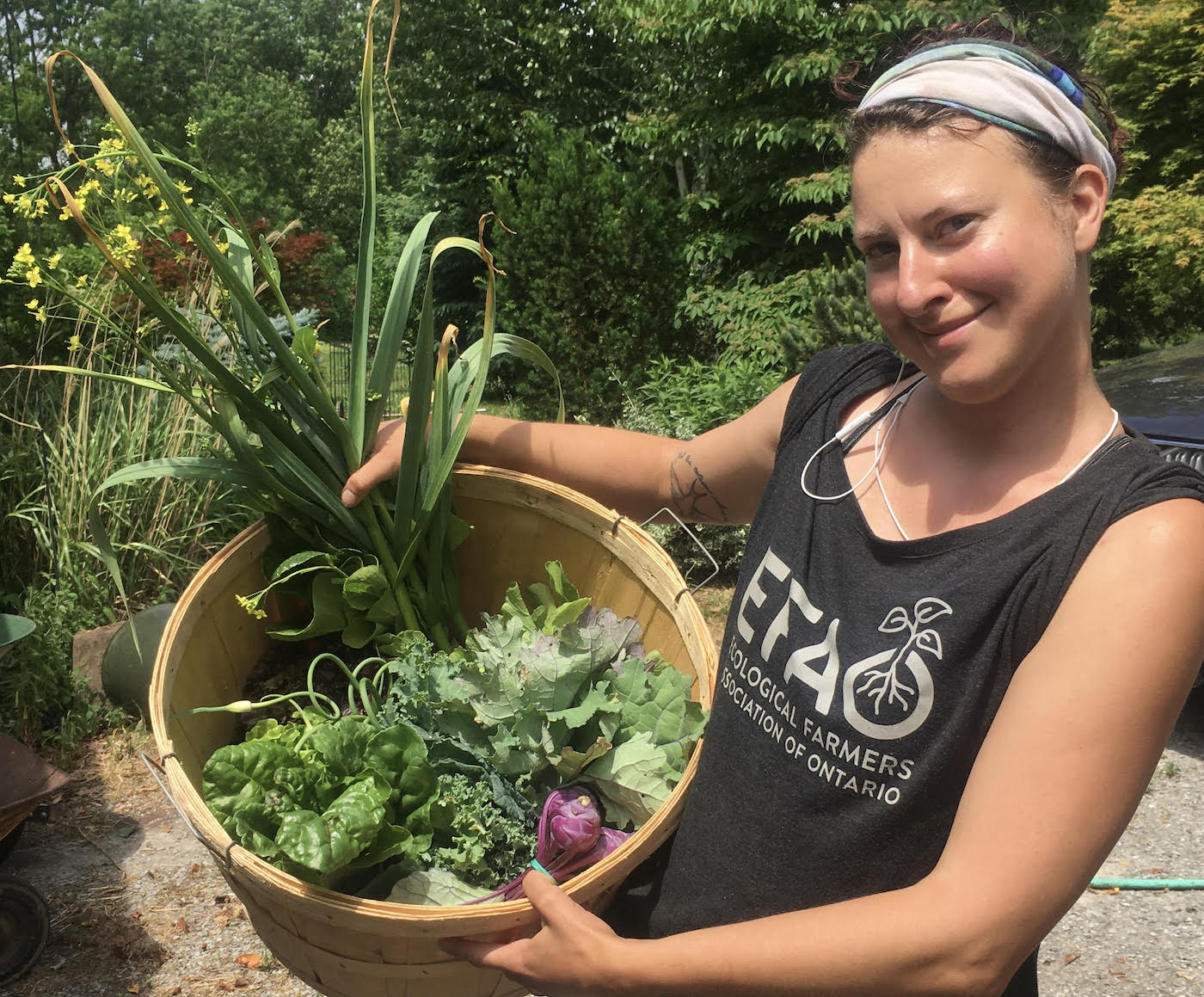Since then, she has grown a food community; but this led me to wonder, what are the philosophies and methods behind the produce?
What were your biggest motivations to start something new on your family's property?
I wanted a change of scenery in my life and I just wanted to see if I could do it.
You've mentioned how WWOOFing in BC and Nova Scotia (just before you started the farm) informed the initial growth of the farm. Did that work play a role in deciding that Community Supported Agriculture (CSA) baskets should become a key aspect of your business?
I don’t think this work played a key role in choosing CSA as my business model. I was more a general labourer at the farm in BC, and in Nova Scotia it was more of a market garden which focused on homesteading and small, local farmers markets. I guess if anything, I saw the small farmers markets to not be very profitable. That made me want to sell directly to consumers with a subscription service so that I knew my products were already sold as I grew them.
Prior to [WWOOFing in Nova Scotia], I was working in a health food store and volunteering with Young Urban Farmers CSA (their name has changed to Cultivate Toronto). YUFCSA is an organization that turns people's backyards in Toronto into mini farms. I suppose that their CSA program had more of an influence on the way I wanted to run my farm than the two other locations that I volunteered.
Since the start of the pandemic, there's been increased interest and demand for local, organic produce. Do you think this signals a permanent realization that we need to adopt more sustainable food consumption models?
Definitely. I feel we are so, so, so very disconnected from our food system. Suddenly when we cannot have something that we’re used to and finding out why, it’s a huge wake up call. The next few years are going to be very interesting for food producers and consumers.
What do you do as a farmer when the growing season ends in November?
The winter is the time that farmers are tying up loose ends from the season (data entry, employee forms, finances etc). A tremendous amount of planning and administrative tasks go into farming which I think people don’t realize. Planning for next year also includes researching and ordering seed varieties, ordering construction and infrastructure materials.
Winter time is definitely slower moving than the intensity of the summer so it is nice to catch up on coziness – read a book, take a course or go on a trip. Some farmers like myself also seek an off-farm job to make income. Seeding starts back up again in February, so I need to have most of my supplies like growing medium, plug trays, lights and seeds by then, as well as a basic plan and seeding schedule as things really take off in March, and then things start up outside in April.
How might a consumer in Ontario supply their food needs year-round while supporting local farmers, instead of buying produce and such from far away?
I think the best ways to support local farmers over the winter are to try to eat produce that is in season – you can still get some locally grown products like storage potatoes, beets and carrots for example. Kale, cabbage, Brussels sprouts, Swiss chard, spinach and turnips are the hardier winter vegetables that you can likely find locally. You can also try fermented and preserved products that were made from local produce. Signing up for a CSA for the next season helps a farmer buy seeds and materials that they need in advance of the growing season. Some farms also offer winter CSAs. You can also sometimes find Ontario grown frozen fruit and vegetables at the grocery store, or you can buy in bulk during the growing season and ferment, preserve or freeze them yourself.
How does farming without pesticides, among other methods applied, prevent soil depletion and degradation, and sustain your land indefinitely?
These farming methods (such as cover cropping, crop rotation, crop variety as well as supporting pollinators and wildlife) sustain the land by feeding the soil with natural green material, maintaining a healthy rhizosphere, preventing the build-up of pests, ensuring good fruiting of vegetable flowers and ultimately ensuring a good population of pollinators for future farming activities. Ideally you’d like to protect and nourish all parts of the ecosystem and work with nature, not against it. Healthy soil = healthy plants and good yields. By preventing soil depletion and degradation through these methods, the soil should remain healthy for future use.
In addition to CSA baskets, you sell seedlings, so customers can grow their own beans, for instance. Why is equipping people to be more self-sufficient important?
Growing your own food is a right that everyone should be able to access. By equipping people to be more self-sufficient I am contributing to a more food-secure world, it is the ethical thing to do. There is still enough demand for products, even if people are home growing their own for their family. Also when people try growing at home, they realize how much work goes into it, so they often develop more of an appreciation for their local farmers!
In what ways would you like to expand the operations of Rhizome Farms in the years to come?
I am hoping to diversify my CSA program to provide more options for the busy consumer. I’d like to open a farm-to-table cafe on the property as well as offering a variety of guided nature tours, workshops and other activities.
This interview has been edited and condensed.
Written by Vincent Teetsov, Toronto




